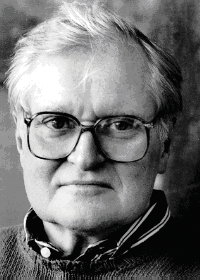One Art
BY PROF. VAROL AKMAN
Chair of the Department of Philosophy
This is a new, regular section of Bilkent News dedicated to English- language poetry (American or British). Every week part of a poem will be printed along with a brief paragraph about its poet, a quip, a tiny personal interpretation, and a photo. Not reproducing a poem in its entirety makes life easier vis-à-vis copyright issues. Nowadays it should be a simple matter to locate the complete verse on the web and pointers will be given when that is not the case.
John Ashbery
Ashberry was born in Rochester, N.Y., in 1927 and educated at Deerfield and Harvard (B.A. 1949). He attended Columbia University (M.A. 1951).  In 1955, he went to France where he stayed for ten years. Ashbery gained widespread recognition with the publication of Self-Portrait in a Convex Mirror. He is credited with more than twenty volumes of poetry and many distinctions, among them the Pulitzer Prize, the National Book Award, and the National Book Critics Award. Ashbery is a member of the American Academy of Arts and Letters. Ashbery's view of poetry is a bit pragmatic: "There is the view that poetry should improve your life. I think people confuse it with the Salvation Army."
In 1955, he went to France where he stayed for ten years. Ashbery gained widespread recognition with the publication of Self-Portrait in a Convex Mirror. He is credited with more than twenty volumes of poetry and many distinctions, among them the Pulitzer Prize, the National Book Award, and the National Book Critics Award. Ashbery is a member of the American Academy of Arts and Letters. Ashbery's view of poetry is a bit pragmatic: "There is the view that poetry should improve your life. I think people confuse it with the Salvation Army."
I remember reading the following poem precisely 26 years ago in The New York Times Magazine. The dazzling first half creates a mysterious landscape of pursuit. This is then followed by an evocative world of "plenty" and calm which is of lyric beauty. Note however that the eminent critic Helen Vendler identified Death as the unnamed pursuer in the poem. She observed that the poem assembles an almost inconceivable state of affairs, bringing peril and sweetness, dread and yearning together.
At North Farm
Somewhere someone is traveling furiously toward you,
At incredible speed, traveling day and night,
Through blizzards and desert heat, across torrents, through narrow passes.
But will he know where to find you,
Recognize you when he sees you,
Give you the thing he has for you?
Hardly anything grows here,
Yet the granaries are bursting with meal,
The sacks of meal piled to the rafters.
. . .